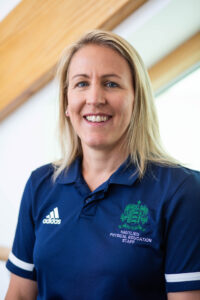
The study of Physical Education enables us to make informed decisions about maintaining an active and healthy lifestyle. The benefits of studying Physical Education are far-reaching and are difficult to obtain through other subjects, including both increased physical health, better academic performance, and the development and understanding, off, fundamental motor skills. Furthermore, the subject develops essential soft skills such as teamwork, communication skills and leadership skills, that universities and employers are looking for.
GCSE Physical Education is an interesting and challenging learning experience that offers an excellent mixture of practical and theoretical study over the course of the two years. It is an excellent base for the progression into any Physical Education course, in particular the A Level Physical Education.
At GCSE and A Level the course covers a diverse range of theoretical topics relating to physical activity, sport and fitness, to include; anatomy and physiology, sports psychology and sociology topics. We introduce key sporting theories, show how these interact with practical performance, and then develop an understanding of the relationships they have with each other throughout the course. All these courses will develop transferable skills including; decision making, independent thinking and problem solving.
At GCSE in the practical components of the course students become increasingly physically competent through being actively engaged in a range of physical activities, whilst taking on other roles such as official and coach in the lessons. At A Level, students specialise in one fully competitive sport in either performing or coaching. At GCSE and A-Level, PE involves analysing your own and others’ performance while looking for ways it could be improved. This is a particularly useful skill to have in your career as you’ll often have to critique your own work and identify areas for improvement.
Throughout your time at Hautlieu School there will be a range of extra-curricular training and fixture opportunities made available to you. In previous years we have offered fixtures in Badminton, Netball, Football, Basketball, Rugby, Hockey, Rounders, Cricket, Softball and Rounders. We also have recreational fitness sessions twice a week in the excellent fitness facility at Oakfield Sports Centre.
Beyond A Level study, the study of Physical Education and Sports Science can lead on to a vast range of university degrees or employment opportunities in sports science, sports management, healthcare, or exercise and health, to name just a few. Physical Education can also complement further study in biology, human biology, physics, psychology, nutrition, sociology, teacher training and many more. The transferable skills you learn through your study of Physical Education, such as decision-making and independent thinking are also useful in any career path you choose to take.
©2025 Hautlieu School | Terms & Conditions | Privacy Policy | GDPR

Your message has been sent to the School Office. They will make contact with you at the email you provided.
Thanks